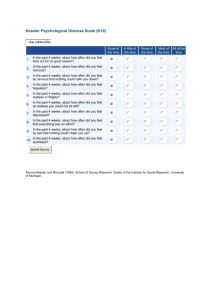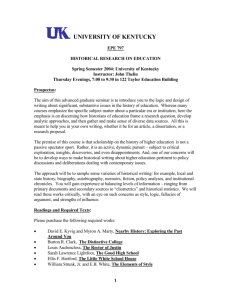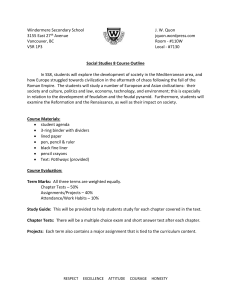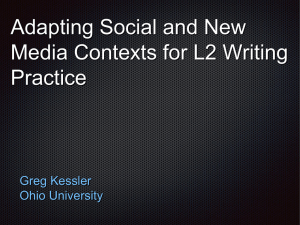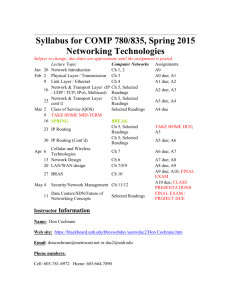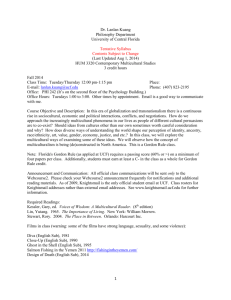Introduction to Religious Studies
advertisement
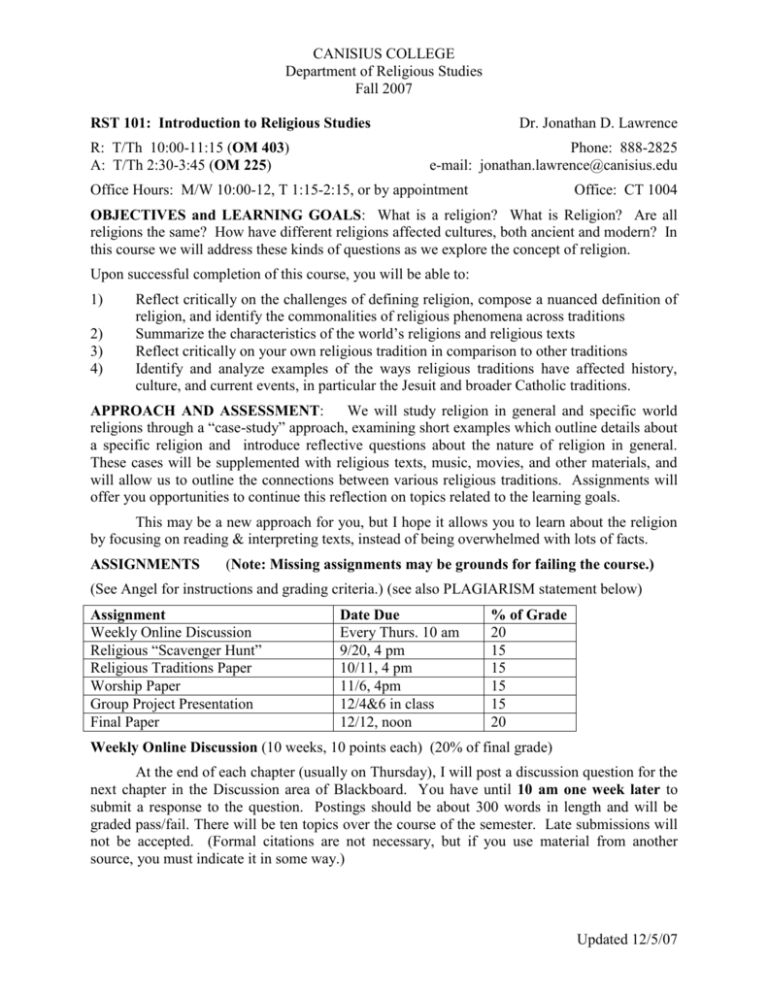
CANISIUS COLLEGE Department of Religious Studies Fall 2007 RST 101: Introduction to Religious Studies R: T/Th 10:00-11:15 (OM 403) A: T/Th 2:30-3:45 (OM 225) Dr. Jonathan D. Lawrence Phone: 888-2825 e-mail: jonathan.lawrence@canisius.edu Office Hours: M/W 10:00-12, T 1:15-2:15, or by appointment Office: CT 1004 OBJECTIVES and LEARNING GOALS: What is a religion? What is Religion? Are all religions the same? How have different religions affected cultures, both ancient and modern? In this course we will address these kinds of questions as we explore the concept of religion. Upon successful completion of this course, you will be able to: 1) 2) 3) 4) Reflect critically on the challenges of defining religion, compose a nuanced definition of religion, and identify the commonalities of religious phenomena across traditions Summarize the characteristics of the world‟s religions and religious texts Reflect critically on your own religious tradition in comparison to other traditions Identify and analyze examples of the ways religious traditions have affected history, culture, and current events, in particular the Jesuit and broader Catholic traditions. APPROACH AND ASSESSMENT: We will study religion in general and specific world religions through a “case-study” approach, examining short examples which outline details about a specific religion and introduce reflective questions about the nature of religion in general. These cases will be supplemented with religious texts, music, movies, and other materials, and will allow us to outline the connections between various religious traditions. Assignments will offer you opportunities to continue this reflection on topics related to the learning goals. This may be a new approach for you, but I hope it allows you to learn about the religion by focusing on reading & interpreting texts, instead of being overwhelmed with lots of facts. ASSIGNMENTS (Note: Missing assignments may be grounds for failing the course.) (See Angel for instructions and grading criteria.) (see also PLAGIARISM statement below) Assignment Weekly Online Discussion Religious “Scavenger Hunt” Religious Traditions Paper Worship Paper Group Project Presentation Final Paper Date Due Every Thurs. 10 am 9/20, 4 pm 10/11, 4 pm 11/6, 4pm 12/4&6 in class 12/12, noon % of Grade 20 15 15 15 15 20 Weekly Online Discussion (10 weeks, 10 points each) (20% of final grade) At the end of each chapter (usually on Thursday), I will post a discussion question for the next chapter in the Discussion area of Blackboard. You have until 10 am one week later to submit a response to the question. Postings should be about 300 words in length and will be graded pass/fail. There will be ten topics over the course of the semester. Late submissions will not be accepted. (Formal citations are not necessary, but if you use material from another source, you must indicate it in some way.) Updated 12/5/07 RST 101: Intro to Religion Fall 2007 Lawrence 2 Religious “Scavenger Hunt” (15% of final grade, due 9/20, 4 pm) You will be asked to fill in a chart that locates and counts the congregations of various religious traditions in your community and then write a two-page reflection on your findings. Religious Traditions (15% of final grade, due 10/11, 4 pm) You will be asked to select an unfamiliar religious tradition from those you encountered in the Scavenger Hunt and write a three-page paper summarizing its history, beliefs, practices, and its role in current events, contrasting it to your own tradition. Worship Paper (15% of final grade, due 11/6, 4 pm) You will be expected to attend two worship services from outside your own tradition – one Christian, and one non-Christian, and write a four-page paper analyzing your observations using concepts presented in the course. There will be an optional class trip to a synagogue for a tour and Friday night service. Group Projects: (15 % of final grade, Presentations 12/4 & 6) Students will divide themselves into groups of 5 and will, as a group, design their own religion. The group will lay out the major outlines of the religion (monotheistic/ polytheistic/ non-theistic; small- or large-scale, etc.). Each student will be individually responsible for designing or fleshing out one aspect of that religion: ritual, myth, iconography and/or art, music, historical development, ethics, etc. Groups will be organized by students at the beginning of the semester and there will be intermediate due dates throughout the semester. Students are recommended to visit the instructor for guidance on their projects. Presentation: Groups will present their religions in front of the class on 12/4 & 6. Each student should present on the aspect of the religion which he or she has developed. Group presentations must be no more than 25 minutes. You must turn in all files on the day of your presentation. Grading: Each group will receive a grade for the project, which will be adjusted individually based on peer ratings by the group members of each person’s contribution. Note: Please do not focus your religion around alcohol or illegal drugs. While these materials do play a role in certain religions, focusing on them would likely distract you from other, potentially more significant, aspects of religion. Final Paper – Reflections – five pages (15% of semester grade) Due 12/12, noon. Students will summarize and reflect on their aspect of the group project and analyze how that aspect fits into their definition of religion, with discussion of the religion their group created and at least one world religion. (Students doing art or music components for their projects particularly should see me about write-ups.) Alternate Assignments 1) Campus Lectures –2 page summary & response (replaces Traditions Paper) - 9/27 (time and place tba) – George Weigel (Catholic Theologian / Historian) Updated 12/5/07 RST 101: Intro to Religion Fall 2007 Lawrence 3 2) Service Learning If you are interested in doing a service-learning project in lieu of another class assignment, please speak to me as soon as possible to find a placement and arrange a contract. See http://www.canisius.edu/servicelearning/ for more information. If you sign a Service Learning Agreement, you will be expected to fulfill that commitment and will not be able to switch back to the other assignment. TEXTBOOKS There is one required textbook for the course (available in the bookstore). Please bring it to every class, unless told otherwise. (additional readings may be given online) REQUIRED: Studying Religion, An Introduction Through Cases, 2nd Ed. Gary E. Kessler OPTIONAL: Catholic Evangelization in an Ecumenical and Interreligious Society (USCCB) POLICIES Evaluation: You will have many opportunities to succeed and challenge yourself during this class. Wherever you are starting in terms of knowledge about religion, I hope to see growth and development over the semester. While I hope that we can focus on your learning, grades must be calculated as well. As I see it, grades for this class will reflect your progress towards the course goals, rather than any value judgment about you or your ideas. I sometimes use student papers (with names removed) as examples of how students have done the assignments. If you do not wish your papers to be used in this way, please let me know. Otherwise I will assume your permission to use your papers in this way. Attendance and participation: Successful completion of the course and assignments depends on regular attendance. If an absence is unavoidable, please notify the professor. Participation in class discussions is expected. Exceptional contributions to class discussions may raise grades that are borderline (between B+/A-, etc.). Disruptive behavior in class will not be tolerated. Disruptions or excessive absences will be grounds for reduction of grade or failure of the course. Here is the grading scheme for the course. +‟s and –„s represent gradations between categories. Letter Grade A Numerical Cutoff 4.0 Description Exceptional work that exceeds the expectations for an Aand shows creativity and careful analysis of material. A- 3.7 B+ B BC+ C CD 3.3 3.0 2.7 2.3 2.0 1.7 1.0 Superior effort & impressive results. Shows exceptional mastery of concepts, & goes well beyond requirements. Above average; may be excellent work with several small errors or flaws. Work which is solid, and shows command of concepts. Satisfactory. Fulfils basic criteria of assignment, but does not go beyond minimal requirements F 0 Substandard. Major flaws, no mastery of major or minor concepts. May not have fulfilled requirements. Failure to complete requirements or unacceptable work. Updated 12/5/07 RST 101: Intro to Religion Fall 2007 Lawrence 4 Due Dates for readings and assignments: Assigned readings are to be completed by the day indicated in the syllabus. Other readings are to be completed when assigned. I will start class each day by calling on several people for a comment or question based on the day‟s readings as a way to get the discussion started, so bring your questions. Papers must be submitted online (through turnitin.com) by 4 pm on the day indicated below to allow prompt and consistent grading. If possible, save papers in MS-Word format and make sure you put your UserID in the file name. Each student is allowed one extension to be arranged before the paper is due. No late papers will be accepted. It is your responsibility to make sure that your papers are submitted on-time and in the proper format. If you are having technical problems with turnitin.com or Blackboard, make sure you notify the professor immediately or your paper will be considered missing. Plagiarism: (see www.canisius.edu/integrity/) Students are expected to abide by all provisions of the Code of Academic Integrity. All written assignments are expected to be the student‟s own work and not someone else‟s. You are encouraged to discuss the readings with your classmates, but the papers must be in your own words. Please do not use someone else‟s ideas, words, theories, opinions, and/or facts which are not common knowledge without proper citation. (NOTE – the one exception is opinions which were already mentioned in class discussion – these need not be cited in the standard way, but you must indicate that the idea came from class and not from yourself.) Plagiarism is a serious offence. It is considered wrong because it is stealing another person‟s ideas, theories, methods, etc., and it is lying because you are representing something as your own when it is not yours. Plagiarism includes not citing sources (even if re-worded or placed in quotes), improper paraphrasing, & not citing a quote from a source cited elsewhere in the paper. At minimum, anyone caught plagiarizing will be asked to rewrite the paper for a reduced grade, but extreme cases will lead to automatic failure of the course. (See course website or professor for further information. If you‟re unsure about proper citation it is better to ask for clarification.) All papers will be submitted through turnitin.com, a website that checks each paper against previously submitted papers and all kinds of material available online, giving a color-coded report that highlights any parts of the paper that appear to be borrowed from someone else‟s work. The system will allow you to submit a preliminary draft to see if there are any problems with paraphrasing, etc. I see turnitin.com primarily as a tool for helping learn how to paraphrase and keeping everyone honest, sort of like random drug tests for athletes, not as a punishment. Students with Disabilities: Students with any special instructional needs due to documented learning disabilities or health problems should advise the professor of those needs by the close of the first week of classes. If there are any other special circumstances which will affect your ability to participate in the class, feel free to discuss them with the professor. Angel: The Canisius College Angel (Angel.Canisius.edu) system will be used for posting of course-related files, schedule updates, periodic feedback surveys, and grades. If you have any difficulties using the system, please notify the professor immediately. Updated 12/5/07 RST 101: Intro to Religion Fall 2007 Lawrence 5 SCHEDULE (supplemental readings will be posted online and announced in class) 8/28 - Introduction Complete online survey by 4 pm Wed. 8/29 8/30 – no class – Mass of the Holy Spirit / Picnic 9/4 - Kessler Ch. 1 – Introduction (Optional: Read Catholic Evangelization, pp. 1-9) 9/6 - Kessler Ch. 2 – Introduction, Continued 9/6 – First Discussion Question due 9/11, 13 - Kessler Ch. 3 – Sacred Power 9/13 – List of Group members due 9/18, 20 - Kessler Ch. 4 – Myth 9/20 – Scavenger Hunt Assignment Due 9/25, 27 - Kessler Ch. 5 – Ritual 10/2, 4 - Kessler Ch. 6 – Space, Time, and Art 10/4 – Group Project Statement Due 10/9 – No Class – Fall Break 10/11, 16 - Kessler Ch. 7 - Experience 10/11 – Religious Tradition Paper Due 10/18, 23 – Kessler Ch. 8 – Evil 10/25, 30 - Kessler Ch. 9 – Morality 11/1, 6 - Kessler Ch. 10 – Organizing 11/1 – Group Project Outline 11/6 – Worship Paper Due 11/8, 13 - Kessler Ch. 11 – Human Existence, Destiny 11/15, 20 – No Class (Professor Out of Town) 11/22 – No Class – Thanksgiving 11/27, 29 – Kessler Ch. 12, Wrap-up 11/29 – Last Discussion Question due 12/4 – Group Presentations Groups 1-3 12/6 – Group Presentations Groups 4-5 12/12 Final Paper due at noon NOTE – this syllabus is a tentative outline of the course schedule and activities. It may be adjusted over the course of the semester. Any changes to readings or assignments will be discussed in class or by e-mail. I reserve the right to adjust any of these policies according to my professional judgment and the circumstances. Updated 12/5/07
